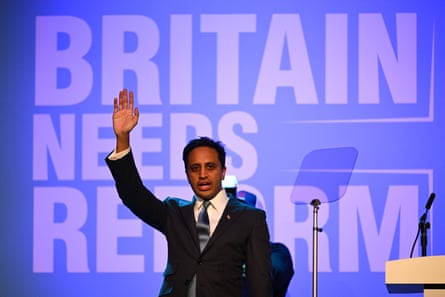Reform UK was right to start a debate on banning the burqa even though it triggered the resignation of its chair, Richard Tice, the party’s deputy leader, has said.
Tice, who is one of five Reform MPs, said he was “enormously sad” that Zia Yusuf had quit as chair as he was partly responsible for the party’s strong performance in May’s local elections.
But Tice said politics could be brutal and defended Reform’s choice to raise the issue of a burqa ban, saying the discussion must not be “forced underground” when it was a policy in a number of European countries.
Tice told BBC Radio 4’s Today programme: “I think it is right that we should have a debate about whether or not the burqa is appropriate for a nation that’s founded in Christianity, where women are equal citizens and should not be viewed as second-class citizens.”
Asked whether he supported a ban, he said he was “pretty concerned” about whether the burqa was a “repressive item of clothing”, adding: “Let’s ask women who wear the burqa, is that genuinely their choice?”
Tice also dismissed claims that Yusuf’s departure showed Nigel Farage struggles to retain senior figures after the Tory leader, Kemi Badenoch, said it demonstrated that Reform was a “fanclub” not a political party.
“Kemi Badenoch is just jealous that she doesn’t have any fans at all,” Tice said.

Yusuf, who is Muslim, resigned as the chair of Reform UK on Thursday after suggesting it was “dumb” of the party’s newest MP, Sarah Pochin, to ask the prime minister if he would ban the burqa.
Yusuf, a donor to Reform and a businessman, said he was resigning after less than a year in the job because he did not believe working to get a Reform government elected was a good use of his time.
The new Reform MP for Runcorn and Helsby had pressed Keir Starmer on the burqa in parliament on Wednesday and Farage had also said on GB News that it was time for a debate about the burqa.
Hours before resigning, Yusuf had posted on X saying it was “dumb” for a party to have asked the prime minister to ban the burqa when it was not its own policy.
In a statement on X, Yusuf said: “Eleven months ago I became chairman of Reform.
“I’ve worked full-time as a volunteer to take the party from 14 to 30%, quadrupled its membership and delivered historic electoral results. I no longer believe working to get a Reform government elected is a good use of my time, and hereby resign the office.”
Yusuf has been working on Reform’s new Elon Musk-style “department of government efficiency” (Doge) unit looking at cutting spending in councils where the party is in control.
The tech entrepreneur Nathaniel Fried, who was brought in this week with great fanfare to lead the unit, will also be departing alongside Yusuf, leaving the party’s plans to slash “waste” in local government in disarray.
Polly Billington, a Labour MP in Kent, said: “Reform are pitching to be a party of government, but the utter shambles we have seen so far on Kent county council will be of huge concern to voters who want to be sure our roads, buses and children’s services are in good hands.
“More than a third of council meetings have already been cancelled this month, where vitally important decisions are made for our county, and two of the five members of ‘Doge for Kent’ have quit after less than a week. Reform need to get a grip and bring an end to this unprecedented chaos.”
Yusuf has been close to Farage over the past year and the party leader is upset about his chair going, according to Tim Montgomerie, a Reform supporter and commentator. Yusuf’s exit is likely to add to the impression that Farage struggles to retain senior figures in his parties.
In a statement, Farage said he was genuinely sorry that Yusuf had decided to stand down as Reform UK chair.
He said: “As I said just last week, he was a huge factor in our success on 1 May and is an enormously talented person. Politics can be a highly pressured and difficult game and Zia has clearly had enough. He is a loss to us and public life.”
Farage expanded on the reasons for Yusuf’s departure on GB News, saying he could tell even before the burqa row that the chair had had enough and was “very disengaged”.
He said he was sad and paid tribute to Yusuf’s organisational skills, but also suggested he had weaknesses.
Farage, revealing that he had had 10 minutes’ warning of the resignation, said: “When people have exceptional strengths in some areas of their life, or other areas where perhaps they’re not quite so strong, I think, in terms of dealing with staff there was a bit of a Goldman Sachs-type mentality. I mean, politics is different.
“And I think when you come from the background he comes from, say, Goldman Sachs, where he worked, it is a really tough, brutal environment. Politics isn’t like that. Politics isn’t just about creating a financial bottom line, it’s about doing things that are thoughtful, creative and different.
“So were his interpersonal skills at the top of his list of attributes? No. But I always found, with me, he was very polite, very objective in conversations that I had.”

 3 months ago
97
3 months ago
97

















































